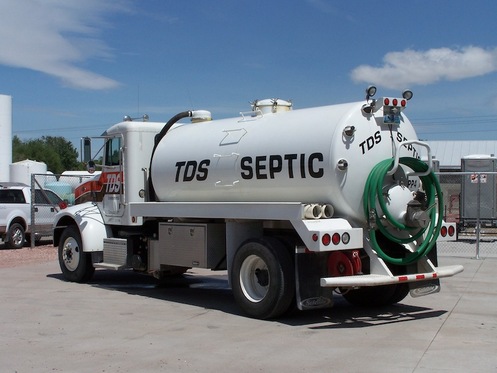Septic Pumping

With demand growing for septic services in TDS's service area, the company began septic pumping operations in 2010. Using the most advanced equipment available, and a well-trained and responsive staff, TDS has seen its customer-base grow steadily since services began.
A septic tank is one of the most important systems in a home or business. Located underground, the septic tank stores wastes from a variety of fixtures and appliances; washing machines, sinks, showers and toilets all depend on a properly maintained septic system in order to process waste.
The average home, with two baths and three family members, will produce 250 to 300 gallons of wastewater per day. That's 85,000 gallons per year!
A septic tank collects this wastewater and separates the scum and solids, pretreating the wastewater before it flows into the drain field.
Heavier matter that flows into the septic tank, such as toilet paper and other solid items, sink to the bottom of the tank, creating sludge. Organic matter like oils, fats, proteins and other compounds float to the top, creating scum. However, most of the material in a septic tank is effluent, the gray water that carried sludge and scum to the tank.
A properly functioning septic system also has a beneficial effect on the soil. The effluent, which is broken down and separated from the solid waste, is released from the septic tank into the drain field.
However, a malfunctioning septic system can be a property owners worst nightmare. Leaking, untreated sewage is unsanitary and pungent and septic tank repair can be expensive. Regular inspection and maintenance of your septic tank can prevent these problems.
Pump your system regularly, at least every two years.
Put a riser on your tank for easier accessibility and inspection.
Know where your septic tank and drain field are located.
To ensure that your septic tank is working properly, you should avoid flushing the following materials down your drain:
A well maintained septic system can operate efficiently for decades!
For more information and useful tips on septic systems, access the University of Wyoming Extension Services' "Understanding and Maintaining Your Septic System" by clicking on the link.
A septic tank is one of the most important systems in a home or business. Located underground, the septic tank stores wastes from a variety of fixtures and appliances; washing machines, sinks, showers and toilets all depend on a properly maintained septic system in order to process waste.
The average home, with two baths and three family members, will produce 250 to 300 gallons of wastewater per day. That's 85,000 gallons per year!
A septic tank collects this wastewater and separates the scum and solids, pretreating the wastewater before it flows into the drain field.
Heavier matter that flows into the septic tank, such as toilet paper and other solid items, sink to the bottom of the tank, creating sludge. Organic matter like oils, fats, proteins and other compounds float to the top, creating scum. However, most of the material in a septic tank is effluent, the gray water that carried sludge and scum to the tank.
A properly functioning septic system also has a beneficial effect on the soil. The effluent, which is broken down and separated from the solid waste, is released from the septic tank into the drain field.
However, a malfunctioning septic system can be a property owners worst nightmare. Leaking, untreated sewage is unsanitary and pungent and septic tank repair can be expensive. Regular inspection and maintenance of your septic tank can prevent these problems.
Pump your system regularly, at least every two years.
Put a riser on your tank for easier accessibility and inspection.
Know where your septic tank and drain field are located.
To ensure that your septic tank is working properly, you should avoid flushing the following materials down your drain:
- Salt
- Cleaning chemicals
- Food scraps
- Hygiene products and other toiletries
- Cooking oil and grease
A well maintained septic system can operate efficiently for decades!
For more information and useful tips on septic systems, access the University of Wyoming Extension Services' "Understanding and Maintaining Your Septic System" by clicking on the link.
Contact TDS for more information or to schedule a septic pumping. (307) 532-7515
TDS Collection Service Inc. • 2126 East A Street • Torrington, Wyoming, 82240
• Phone: (307) 532-7515 • Fax: (307) 532-3467 • Email Us: [email protected]
